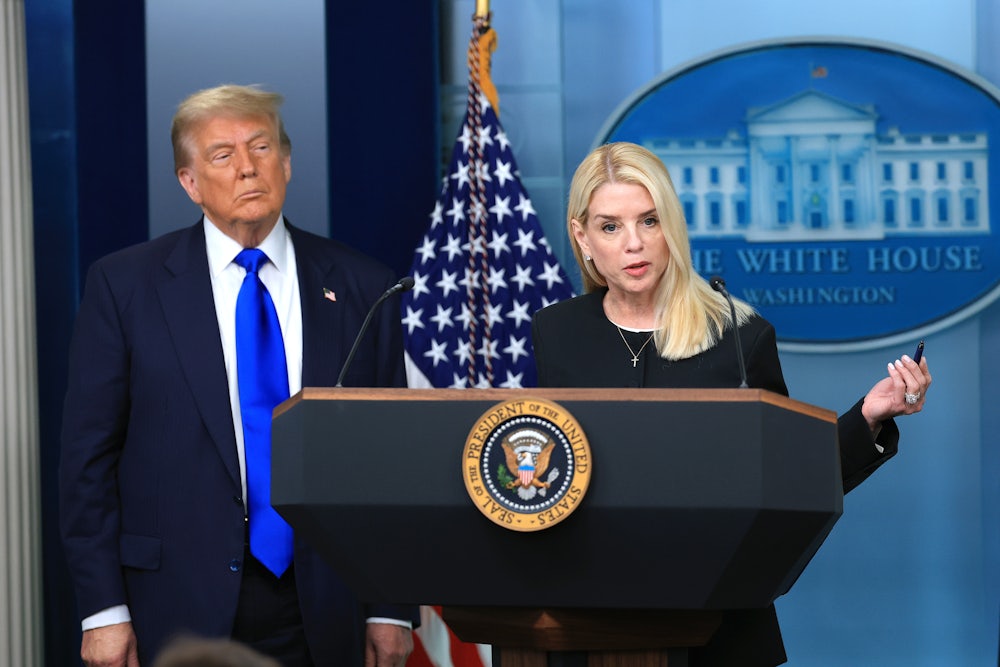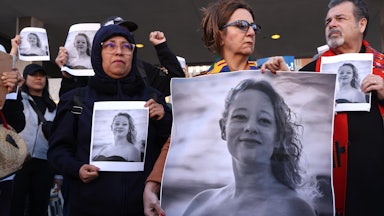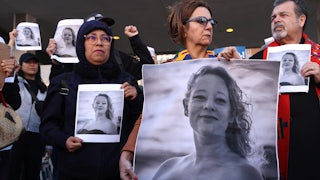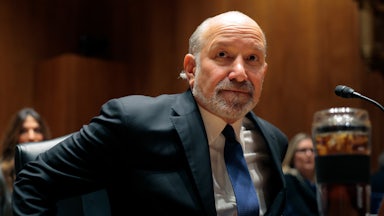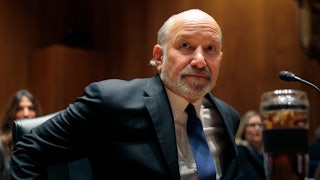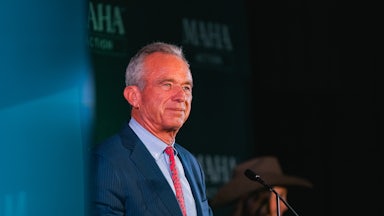The Trump administration has taken a sledgehammer to the nation’s network of programs designed to prevent domestic violence and sexual assault, as well as those that serve to support the survivors of these harrowing crimes. That doing so would be part of President Trump’s agenda came as no surprise to some in the field: “There’s a real denial of sexual violence and a minimizing of the seriousness of sexual violence [in the Trump administration],” said Judith Levine, co-author of The Feminist and the Sex Offender: Confronting Sexual Harm, Ending State Violence.
“There is, in fact, a glorification of violence by the state and also a glorification of misogyny,” Levine continued. In Trumpworld, influential individuals accused of sexual misconduct are rewarded with Cabinet positions, while organizations that provide services to survivors are forced to scramble to keep their doors open.
Problems began soon after Trump returned to office. In April 2025, the Department of Justice terminated hundreds of grants, valued at over $800 million. Among the canceled grants were those funding hundreds of web-based resources for survivors seeking support, interpretation services for deaf and hard-of-hearing survivors, emergency housing for those fleeing domestic violence, and training programs for law enforcement on how to serve disabled survivors of sex trafficking.
Form emails sent to grant recipients claimed the “awards no longer effectuate[d] the program goals or agency priorities.” Other federal grant recipients received similar emails while Elon Musk’s so-called Department of Government Efficiency was running roughshod over federal agencies early in Trump’s term.
“The purpose of these grants was to prevent violence and keep communities safe, and that is not happening right now because the grants were terminated, and a lot of these organizations can’t function without the funding,” said Lisa Newman, senior counsel at Democracy Forward, who is representing plaintiffs in Vera Institute of Justice, et al. v. DOJ, et al., an ongoing lawsuit challenging the grant terminations.
In May 2025, the White House’s 2026 Budget request reduced the DOJ’s grant-making budget by about 15 percent from the previous year and stripped funding and power away from the Office on Violence Against Women, or OVW. That office was established following the Violence Against Women Act of 1994, or VAWA, to respond to and reduce gender-based violence.
When OVW announced funding opportunities that same month, the application included sweeping new conditions requiring potential grantees to adhere to President Trump’s executive orders banning federal funds from being used for “illegal” diversity, equity, and inclusion initiatives or “gender ideology.” Several of the grant opportunities stated that OVW would prioritize applications from local law enforcement agencies that “certify they comply with federal immigration law,” part of Trump’s broader attack on sanctuary cities.
The Trump administration placed similar conditions on grant opportunities from the Departments of Health and Human Services and Housing and Urban Development. Those agencies administer funds for programs to reduce the incidence of sexual assault on college campuses, secure emergency and transitional housing for survivors of domestic violence, and investigate cases of suspected child sexual abuse and exploitation.
Moves to impose ideological conditions on grants and terminate existing funding agreements are also part of an effort to frame sexual violence as isolated criminal acts, rather than a systemic issue. New conditions on OVW-administered grants put it plainly: “Activities that frame domestic violence or sexual assault as systemic social justice issues rather than criminal offenses [are] out of the program scope and will not be funded.”
Gracia Dodds, a survivor advocate and doctoral candidate at the University of Michigan studying the sociology of sexual violence, said that framing is troubling because “sexual violence thrives on isolation … Not thinking about it systemically keeps survivors quiet, it keeps survivors from seeking resources, [and] it allows for violence to continue.”
Progressive legal organizations are challenging the new funding conditions in two lawsuits filed this summer on behalf of several state domestic violence and sexual assault coalitions: Rhode Island Coalition Against Domestic Violence et al. v. Pamela Bondi et al. and Rhode Island Coalition et al. v. Robert F. Kennedy, Jr., et al. Amy Romero, chief legal counsel at Lawyers’ Committee for Rhode Island—and a lawyer for plaintiffs on both cases—said the conditions “presented a conflict not only with the authorizing statutes, because [VAWA] says you have to serve people regardless of gender identity and alienage status, but also with the missions of [the plaintiffs].”
Indeed, Martina Shabram, executive director of Sexual Assault Support Services, or SASS, in Eugene, Oregon, said: “Certifying in that way would require us to engage in activities that are not in keeping with our values, that are not trauma-informed, [and] that are not survivor-centered.… The entirety of our mission would be unallowable under those requirements.” SASS is one of 39 member programs in the Oregon Coalition Against Domestic and Sexual Violence, a plaintiff in the ongoing cases challenging the funding conditions.
The costs to survivors are already being felt. “We’ve had to scale back some of our programming, especially around health support, counseling, and outreach,” explained Shaniyat Turani, development and program specialist at Asiyah Women’s Center in New York City, an organization that focuses on serving the city’s Arab, Middle Eastern, Muslim, South Asian population. Trump’s DOJ cancelled a $200,000 grant to Asiyah Women’s Center in its April terminations. “We’re very limited right now with how many new intakes we can take, so survivors who are depending on us for stable shelter and wraparound care now face an even longer wait time, and there are very few options for them,” Turani said.
Organizations such as the Asiyah Women’s Center that focus their services on survivors of color, immigrants, or the LGBTQ+ community will likely find it more difficult to secure federal grants if Trump’s new funding conditions are allowed to stand. Experts and advocates argue that those organizations are vital to a functioning survivor services network because marginalized populations experience sexual violence at disproportionate rates: One in two women of color experience intimate partner violence in their lifetime, while almost half of all transgender people have been sexually assaulted at some point in their lives. That rate is even higher for trans people of color and disabled trans people.
Additionally, Dodds said that survivor services organizations focusing on specific populations offer “some of the most impactful” programs. “It’s important for someone who holds a shared identity to say, ‘This happened to me, too,’” they explained.
Turani said he has seen the power of culturally specific programming at Asiyah Women’s Center: “Because of that cultural connection and also language access, there’s a sense of safety and connection whenever someone comes in.”
Elsewhere, the uncertainties around future funding opportunities have left organizations in the lurch. “Every quarter gets more and more precarious,” said Shabram. Federal grants have been one of SASS’s most stable sources of funding for much of its 35-year existence, accounting for as much as 40 percent of the organization’s budget in some years. With lawsuits over the new funding conditions ongoing, it is unclear what role federal funds will play in the organization’s budget going forward.
“Pretty much one hundred percent of my job right now is ensuring that we have stable alternative funding streams, such that if the worst happens, we won’t have to lose any services,” said Shabram. Focusing on fundraising has pulled her away from supporting other aspects of organizational development and programming.
Making matters worse, when the government shut down on October 1, 2025, the Trump administration shuttered the DOJ’s grant-making offices, furloughing the OVW grant managers responsible for administering what federal support remains to aid survivors of sexual assault and domestic violence. Those workers have typically worked through previous shutdowns.
If ongoing lawsuits are successful in restoring canceled funding and rolling back the sweeping new conditions on grant programs, advocates are concerned that the shakeup will nonetheless have a chilling effect on both organizations and survivors. “We have heard from service providers that it seems too risky to move forward in even applying for federal grant dollars at this point, so that will have an impact on resources,” explained Dawn Dalton, executive director of the District of Columbia Coalition Against Domestic Violence, an organization with 17 member programs and a plaintiff in the cases challenging new funding conditions at DOJ, HHS, and HUD.
Additionally, Dalton said, in the current climate, “survivors from certain populations don’t feel like it is safe for them to reach out for support and resources, and there’s the ripple effect of that, of staying in an abusive relationship and continuing to experience further harm.”
